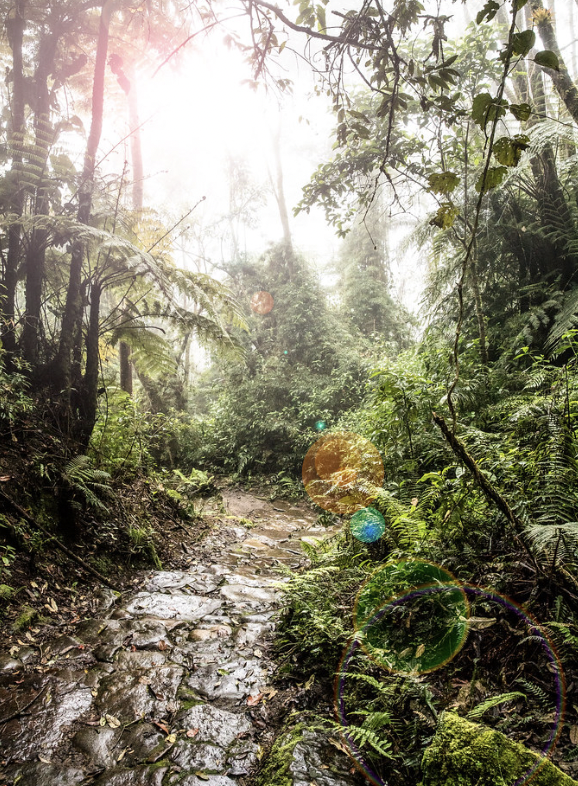Poems by MARÍA PAZ GUERRERO
Translated from the Spanish by STEPHANIE MALAK
Poems appear in both Spanish and English below.
Translator’s Note
María’s poems from Los analfabetas are gut punches. But tender ones. Questions of identity, colonialist practices and education, and the body in its many forms interpolate delicacies of syntax and form. She writes the trammels of Colombia by digging at the splinters of humanity’s illiteracy.
Both poems “India weaves necklaces” and “She heads out to the forest to unearth roots” clip along with a degree of ease perhaps counter to their themes. They conclude in moments of spiritual praxis: the poetic voice subsumes the complexity of the body (and its wounds) and with it some resolution. Finding that same crispness of language between short verse and proximate observation of the human condition made for rich exercise.
—Stephanie Malak
India teje collares
abuela rasga guacharaca
indio se queda en el pueblo
acostado en la hamaca.
Peatón surca lodazales,
lagunillas, esquiva sombrillas rotas
varillas de acero que pinchan carteras y chaquetas.
Ojos ruedan, amainan chubascos, caen aguaceros,
suenan lloviznas
Estábamos afanados, realmente,
acelerados. Torcidos, jodidos, arrejuntados,
de veras, mal dormidos, paniqueados,
hambreados, encorvados, hundidos
escupíamos
al atardecer
soltábamos flemas
en luna llena
nos desgranábamos
India weaves necklaces
the guacharaca grandmother scrapes
indio stays put in town
stretched out in the hammock
Pedestrian plowing through muddy waste
lagoons, dodging broken umbrellas
spokes of steel that poke through billfolds and jackets
Eyes roll, cloudbursts subside, downpours fall
drizzles sound
We were snatched up, revved up
for real. Twisted, fucked, shacked up,
straight up, underslept, panicked
starving, bent, sunk
we spat
as it grew dark
unleashed phlegm
under a full moon
we were coming unspun
Sale al bosque a desenterrar raíces
Llena el tiempo de huecos
y mete el escaso cuerpo
en uno de ellos
Cubre su esqueleto del viento
para que la corriente
no roce su superficie de erizo
Se rompería en añicos el aire
al contacto con las puntas
No busca hacerse cortaduras en la cara
ni beber licores fuertes
mucho menos ser vidente
Ya tiene ojos rasgados, piel amarilla
y se pone a ser india
en la mitad del día
She heads out to the forest to unearth roots
Time fills with holes
and puts the scarce body
into one of them
It covers its skeleton of wind
so the current
doesn’t rub against its prickly outside
The air would split into smithereens
if it were touched by the spines
It doesn’t seek to become cuts on the cheek
or drink strong liquor
nor be a seer
She’s already got scratched eyes, yellow skin
as she begins
to be india
at midday
María Paz Guerrero (Bogotá, Colombia) is the author of the poetry collections Los analfabetas and Dios también es una perra, the prologue and selections of La generación sin nombre: una antología, and the essay “El dolor de estar vivo en Los poemas póstumos de César Vallejo.” Her poems have appeared in the anthologies Pájaros de sombra: diecisiete poetas colombianos, 1989-1964 and Moradas interiores: cuatro poetas colombianos. Dios también es una perra is available in English as God is a Bitch Too from Ugly Duckling Presse. She holds a BA from the Universidad de los Andes, a MA in comparative literature from the The New Sorbonne University, and currently is completing her PhD in literary theory at the University of Zaragoza. She is a full-time professor in the department of creative writing at the Universidad Central in Bogotá.
Stephanie Malak is an editor working between academic scholarship, independent publishing, and literary advocacy. She holds a PhD in Latin American literature and lives in the Catskills. She is a contributing editor for The Common.




